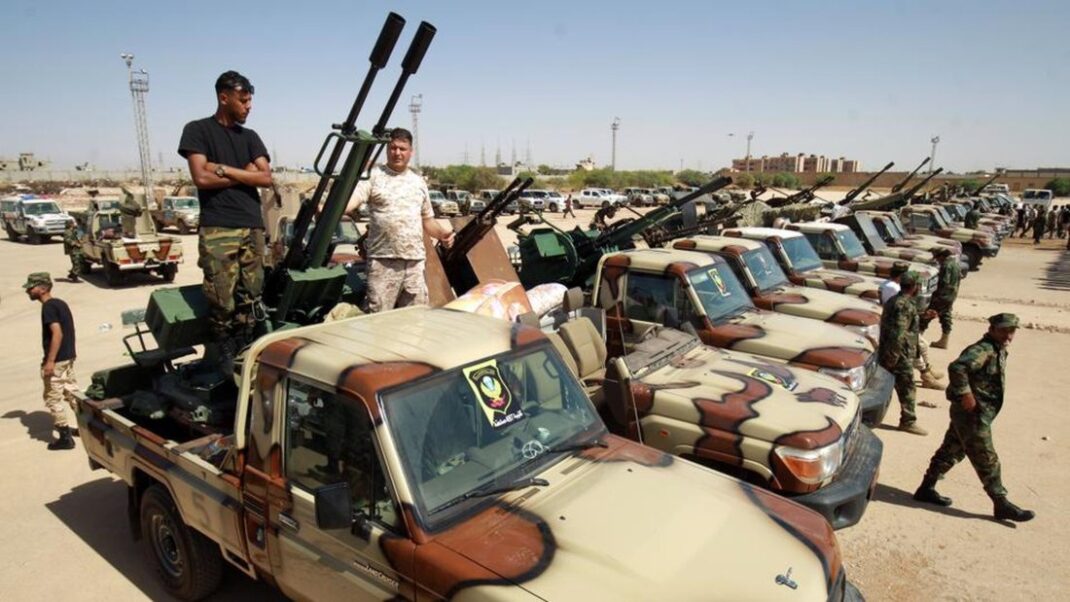 Putschist Gen. Khalifa Haftar’s so-called Libyan National Army (LNA) will not be subordinate to the current Libyan government, the warlord stated Monday.
Putschist Gen. Khalifa Haftar’s so-called Libyan National Army (LNA) will not be subordinate to the current Libyan government, the warlord stated Monday.
In a speech marking the 81st anniversary of the founding of the Libyan army, Haftar underlined that his militia “won’t be subject to any authority except to an authority that will be directly elected by the people.“
Haftar, who is based in the eastern city of Benghazi, added that his militia would withstand any pressure sent in its direction and hinted that it would hinder the city’s attempts to work with the current Libyan authorities.
In February, Haftar declared his support for the new transitional government and a “peaceful and democratic alternation of power” in Libya, according to a statement released by his office. He had welcomed the appointment of the new government, hailing its leaders as “national figures.” However, his recent actions contradict his words.
Haftar continues to operate independently from the legitimate government and continues to lead armed militias, calling himself the commander in chief of the Libyan army.
Libya has been in turmoil since 2011 when a NATO-backed uprising toppled longtime dictator Moammar Gadhafi, who was later killed. The country was since split between rival administrations in the east and the west.
Haftar’s 2019 offensive, supported by Egypt, the United Arab Emirates (UAE) and Russia, collapsed in June 2020 when the Tripoli government, with support from Turkey and Qatar, gained the upper hand. A U.N.-brokered cease-fire was reached in October that stopped hostilities.
Oil-rich Libya is now ruled by a transitional government tasked with preparing the nation for elections in December.
*********
Hafter and HSC conspiring against elections in existentialist fight

Khalifa Hafter, Commander of the eastern-based Libyan Arab Army (formerly the Libyan National Army – LNA) said he will never be subject to any civilian authority and that his eastern-based Libyan Arab Army will not accept deception in the name of civilian rule.
He had been speaking yesterday from Benina Air Base on the occasion of the 81st anniversary of the founding of Libya’s pre-independence Libyan Arab Army.
Hafter shared credit of the role of his Army in forming the Joint Military Committee (5+5 JMC) that played a pivotal role in preparing the country for the Libyan Political Dialogue Forum’s (LPDF) Road Map, which gave birth to the planned 24 December 2021 elections.
Haftar had also announced a series of military promotions, appointments, and reorganizations in the east. This came a day after the Presidency Council had made a statement, in its capacity as the Supreme Commander of the Libyan Armed Forces, in which it stated that issuing decisions to promote officers, appoint commanders of military regions and establish military units, are all the original jurisdiction of the Presidency Council. It had added that any decision that contradicts this from any party or position – is null and void.
Clash with the LPDF Road Map and the GNU/PC
Hafter’s actions and statements seem to contradict and clash with the Libyan Political Dialogue Forum’s (LPDF) Road Map which Hafter recognizes. His reference to the planned 24 December 2021 elections is a case in point.
Moreover, if Hafter recognizes the LPDF Road Map he must recognize the Government of National Unity (GNU) which includes the new post-Faiez Serraj three-member Presidency Council (PC). This includes the recognition of the Presidency Council’s de jure role as Supreme Commander of all of Libya’s Armed Forces.
However, Hafter will nit-pick at the LPDF and Road Map and at the 2015 Libyan Political Agreement (LPA). He will say that the LPDF was an unelected body whereas parliament (the House of Representatives – HoR) was elected in 2014. He will say that Libya’s security apparatus has not been unified and its militias – especially his nemesis militias in western Libya – have not been disarmed, demobilized and reintegrated (DDR) into one unified army. The DDR of Libya’s security forces was a condition of the LPA.
Furthermore, as long as there are no new elections and no new parliament, Hafter will refer to his ‘‘democratic’’ appointment by House of Representatives head Ageela Saleh as a legitimising factor. However, Ageela Saleh and his parliament have granted full recognition to the GNU, including the Presidency Council.
Monopoly on the use of force and need for re-legitimizing elections
Ultimately, despite the accession of the Aldabaiba Government of National Unity and the new three-person Presidency Council, Hafter still commands coercive power in eastern Libya on the ground. Until Libya’s security forces/ armies/ militias are disarmed, demobilized and reintegrated into one unified army under the new democratically elected civilian government, Hafter will remain active and relevant.
Are the status quo forces unified against elections?
The irony is, the status quo forces in western Libya, such as the (unelected) High State Council (HSC), are conspiring with their status quo counterparts in eastern Libya to avoid the holding of elections – which will ensure that Hafter remains in situ.
Polarised politics of fear
This raises the question of whether the status quo forces prefer the polarised political scene with Hafter serving as a convenient scarecrow. If Hafter is to disappear they would have no dictatorial ghoul with which to frighten their opponents. The continued presence of Hafter is as politically convenient for them as the ‘‘terrorists, Islamists and militias’’ in western Libya are the convenient red rag for Hafter to wave in the east.
The anti-election forces in Libya reinforce each other’s existence. At one level they are political enemies but on another level they are allies in opposing elections. Hafter will most probably not be re-appointed to his position if a new parliament is elected and based in the west, just as the HSC will no longer exist if there were elections. The HSC is an unelected body born out of exceptional circumstances in the 2015 Skhirat Libyan Political Agreement (LPA).
Meanwhile, the poor Libyan public remain trapped in this quagmire of contested political legitimacy between their political elite with the resultant weak and ineffective governments that are unable to provide them with their basic needs such as water, electricity, healthcare and security etc.
Both Hafter and the HSC are fighting an existentialist battle – and elections would be their doom. They have no interest in holding elections because Turkeys don’t vote for Christmas!
********
Armies protect capitals, do not storm them: Libyan premier
Muhammad Artima
 In remarks marking 81st anniversary of Libyan army, Abdul Hamid Dbeibeh decries Haftar’s disloyal militia.
In remarks marking 81st anniversary of Libyan army, Abdul Hamid Dbeibeh decries Haftar’s disloyal militia.
National armies protect the capitals of their country, they do not storm them, said Abdul Hamid Dbeibeh, the country’s prime minister and head of its National Unity Government, on Tuesday.
At a celebration marking the 81st anniversary of the Libyan army, the premier made unmistakable reference to a failed April 2019 attack on the capital Tripoli by the militia of renegade Gen. Khalifa Haftar.
“Capitals are precious pearls, and armies were founded to protect them, not to storm them, terrorize their people, and destroy their property, and no national army can terrorize its people and cities for any reason,” said Dbeibeh, according to state TV Al-Watania.
On June 4, 2020, the Libyan army announced the liberation of Tripoli from Haftar’s militia, following an offensive that left countless civilians dead and wounded, along with extensive material damage and destruction.
The withdrawal of Haftar’s militias from other areas of the country was followed by the discovery of many mass graves.
“The army’s job is to protect our land, sea, and air borders” without prejudice,” Dbeibeh said, adding that “the Libyan army was born to protect the peace,” not issue threats.
He stressed that “he who takes war as a means lacks far-sightedness as he sacrifices everyone for the sake of flimsy arrogance.”
In the wake of the 2011 death of strongman leader Muammar Gaddafi, the oil-rich country suffered through years of armed conflict.
With the support of Arab and Western countries, mercenaries, and foreign fighters, Haftar’s militia fought the former internationally recognized Government of National Accord, which enjoyed Turkish support.
“The prestigious army institution cannot be affiliated with a person, whatever his capacity, but rather he is our army and the protector of our protection,” Dbeibeh asserted.
On Monday, Haftar said that his militia would not be subordinate to the current authority, and would only deal with “an authority directly elected by the people.”
This year Libya has witnessed a political breakthrough under UN auspices. On March 16, an elected transitional authority made up of a unity government and a presidential council, assumed their duties to lead the country through a transitional phase to parliamentary and presidential elections slated for Dec. 24.
But Haftar is still flouting the legitimate government and leads an armed militia that controls many areas, and calls himself the “commander-in-chief of the Libyan Armed Forces,” challenging the Presidential Council’s authority.
*Writing by Mahmoud Barakat
___________




